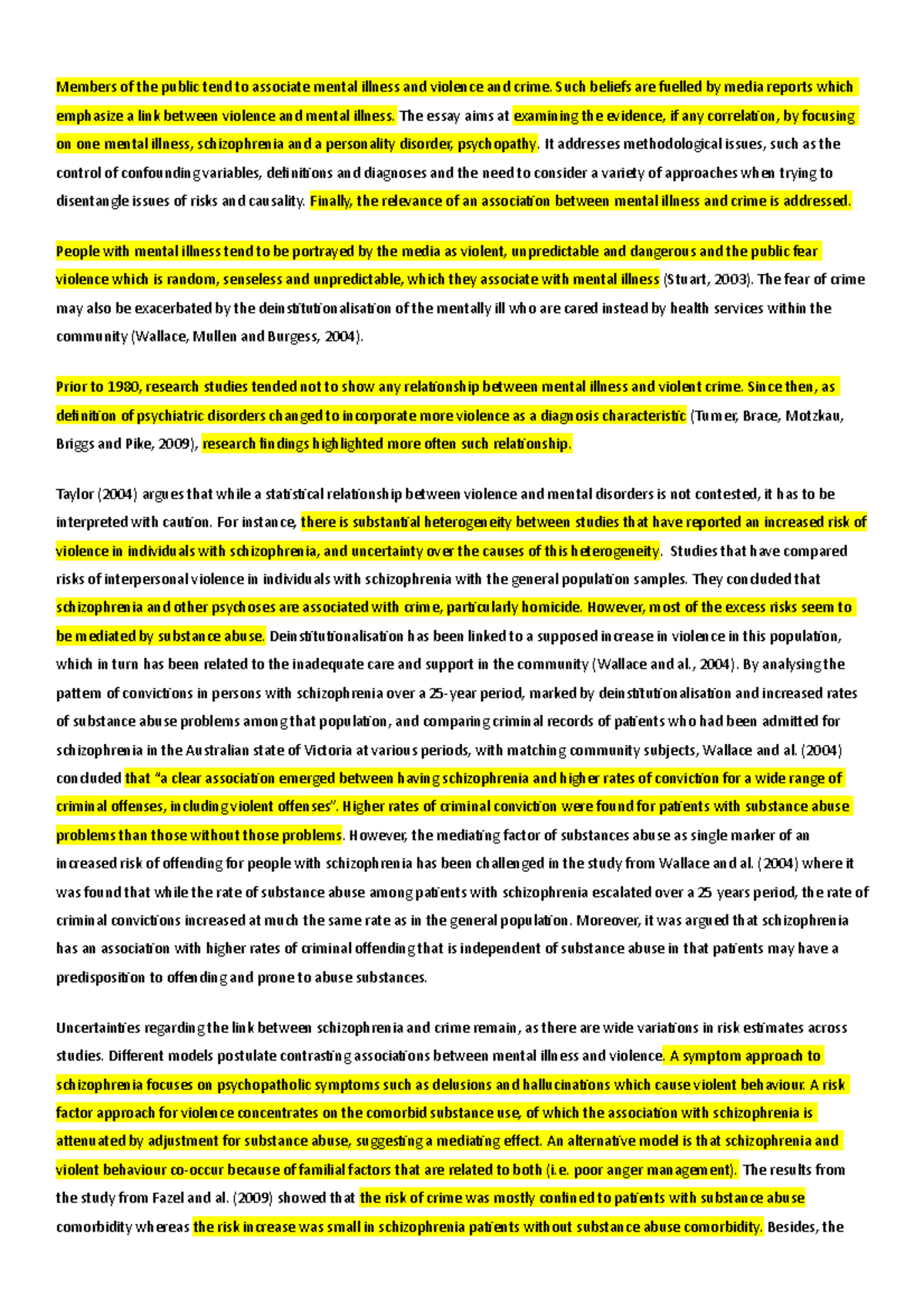Understanding The Complex Relationship Between Mental Illness And Violent Crime

Table of Contents
The Prevalence of Mental Illness in the Criminal Justice System
The criminal justice system houses a disproportionately high number of individuals with untreated mental illnesses. This alarming statistic underscores a critical gap in mental healthcare access and reflects a complex societal issue with far-reaching consequences.
High Rates of Untreated Mental Illness
The incarceration rate for individuals with mental illness is significantly higher than the general population. This is not because mental illness inherently causes violence, but rather because of a multitude of factors, including:
- Lack of Access to Treatment: Many individuals with mental illnesses lack access to adequate and affordable mental healthcare, leading to untreated conditions that may escalate and contribute to risky behaviors. This is especially true for individuals from marginalized communities who face systemic barriers to care.
- Inadequate Mental Healthcare within the Justice System: Jails and prisons often lack sufficient mental health resources and qualified professionals to address the complex needs of incarcerated individuals. This results in inadequate treatment, worsening symptoms, and an increased risk of recidivism.
- Consequences of Untreated Mental Illness on Recidivism: Individuals with untreated mental illnesses are more likely to re-offend, perpetuating a cycle that needs to be broken through effective intervention and treatment. Addressing mental health issues is crucial for reducing recidivism and promoting successful reintegration into society.
The Impact of Substance Abuse
Substance abuse disorders significantly complicate the relationship between mental illness and violent crime. Often, co-occurring disorders (dual diagnosis) are present, where an individual struggles with both a mental illness and a substance use disorder.
- Exacerbation of Mental Health Symptoms: Substance abuse can severely exacerbate symptoms of mental illness, leading to increased impulsivity, aggression, and impaired judgment, potentially increasing the risk of violent behavior.
- Increased Likelihood of Violent Behavior Under the Influence: The intoxicating effects of drugs and alcohol can lower inhibitions and significantly increase the likelihood of violent acts, irrespective of pre-existing mental health conditions.
- Integrated Treatment for Substance Abuse and Mental Illness: Integrated treatment approaches that address both substance abuse and mental health issues simultaneously are crucial for effective management and reducing the risk of violence.
Mental Illness and Types of Violent Crime
It is crucial to understand that not all mental illnesses are equally linked to violent crime. Generalizations are dangerous and perpetuate harmful stereotypes.
Not All Mental Illnesses Are Equally Linked
The relationship between specific mental illnesses and violent crime is complex and varies significantly.
- Schizophrenia: While individuals with schizophrenia may experience psychotic symptoms, the majority are not violent. Violent acts are often associated with untreated psychosis, substance abuse, or other contributing factors.
- Bipolar Disorder: During manic episodes, individuals with bipolar disorder may exhibit impulsive or aggressive behavior, but this is not a defining characteristic of the illness. Proper medication and therapy significantly reduce this risk.
- Depression: While depression itself is not typically associated with violence, it can contribute to suicidal ideation or self-harm. However, it is vital to differentiate between self-directed harm and violence towards others.
It's crucial to avoid broad generalizations and consider the influence of other critical factors.
The Influence of Other Factors
Numerous factors beyond the presence of a mental illness contribute to violent behavior:
- Social Determinants of Health: Poverty, lack of access to education, and social inequality significantly increase the risk of violence, irrespective of mental health status.
- Trauma History: Adverse childhood experiences (ACEs) and past trauma are strongly correlated with an increased risk of both mental illness and violent behavior.
- Lack of Social Support: Isolation and a lack of social support networks can worsen mental health symptoms and increase the likelihood of risky behaviors.
- Environmental Factors: Exposure to violence and other stressors in one's environment can significantly influence the likelihood of violent acts.
Addressing the Issue: Prevention and Intervention Strategies
Addressing the complex issue of mental illness and violent crime requires a multi-pronged approach focusing on prevention, intervention, and systemic reforms.
Early Intervention and Prevention Programs
Investing in early intervention and prevention programs is crucial:
- Early Childhood Mental Health Services: Providing access to mental health services for children and adolescents at risk can prevent the escalation of mental health problems and reduce the likelihood of future violence.
- School-Based Programs: Implementing mental health programs in schools can aid early identification and intervention, providing support and resources to students.
- Community-Based Mental Health Services: Expanding access to community-based mental health services improves early intervention and ongoing care.
Improved Access to Mental Healthcare
Expanding access to quality mental healthcare is paramount:
- Addressing Barriers to Access: Reducing the financial and logistical barriers to accessing mental healthcare is critical, including expanding insurance coverage and providing transportation assistance.
- Reducing Stigma: Reducing the stigma associated with mental illness is crucial to encourage individuals to seek help without fear of judgment.
- Integration of Mental Healthcare: Integrating mental health care into primary care settings can improve early detection and treatment.
Justice System Reforms
Reforming the criminal justice system is essential:
- Diversion Programs: Developing and expanding programs that divert individuals with mental illnesses from the criminal justice system into treatment and support services.
- Mental Health Courts: Establishing specialized courts that address the needs of individuals with mental illnesses, emphasizing treatment and rehabilitation rather than incarceration.
- Training for Law Enforcement: Providing law enforcement and correctional officers with specialized training on how to interact effectively with individuals experiencing mental health crises.
- Alternatives to Incarceration: Exploring and implementing alternatives to incarceration, such as community-based treatment and supportive housing.
Conclusion
The relationship between mental illness and violent crime is intricate and multifaceted. It's not a simple causal link, but rather a complex interaction of various factors, including the presence of untreated mental illness, substance abuse, social determinants of health, and trauma history. Effective strategies necessitate a comprehensive approach encompassing early intervention, improved access to mental healthcare, and justice system reforms. To truly understand and address the issue of mental illness and violent crime, we must move beyond simplistic narratives and embrace a compassionate, evidence-based approach. Learn more about mental illness and support organizations dedicated to improving mental health access and reducing stigma. Let's work together to build a society that supports individuals with mental illnesses and reduces violence in all its forms. For more information, visit [link to relevant organization 1] and [link to relevant organization 2].

Featured Posts
-
 Affaire Bilel Latreche Audience Pour Violences Conjugales A Dijon En Aout
May 09, 2025
Affaire Bilel Latreche Audience Pour Violences Conjugales A Dijon En Aout
May 09, 2025 -
 Agression Au Lac Kir Dijon Trois Victimes Blessees
May 09, 2025
Agression Au Lac Kir Dijon Trois Victimes Blessees
May 09, 2025 -
 Samuel Dickson Contributions To Canadian Industry And Forestry
May 09, 2025
Samuel Dickson Contributions To Canadian Industry And Forestry
May 09, 2025 -
 Expensive Babysitter Costs Lead To Even Higher Daycare Fees One Mans Dilemma
May 09, 2025
Expensive Babysitter Costs Lead To Even Higher Daycare Fees One Mans Dilemma
May 09, 2025 -
 Pam Bondi Announces Record Breaking Fentanyl Seizure
May 09, 2025
Pam Bondi Announces Record Breaking Fentanyl Seizure
May 09, 2025
Latest Posts
-
 News From The Bangkok Post The Push For Better Transgender Rights
May 10, 2025
News From The Bangkok Post The Push For Better Transgender Rights
May 10, 2025 -
 The Bangkok Post And The Ongoing Struggle For Transgender Equality
May 10, 2025
The Bangkok Post And The Ongoing Struggle For Transgender Equality
May 10, 2025 -
 The Impact Of Trumps Executive Orders On The Transgender Community A Call For Stories
May 10, 2025
The Impact Of Trumps Executive Orders On The Transgender Community A Call For Stories
May 10, 2025 -
 Examining Transgender Equality Issues Highlighted By The Bangkok Post
May 10, 2025
Examining Transgender Equality Issues Highlighted By The Bangkok Post
May 10, 2025 -
 The Bangkok Post And The Fight For Transgender Equality In Thailand
May 10, 2025
The Bangkok Post And The Fight For Transgender Equality In Thailand
May 10, 2025
